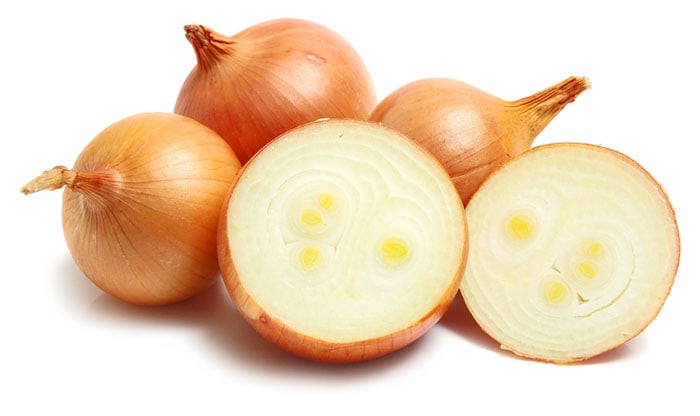
Written By: Sofia Layarda, MPH
Title: Master of Public Health
Alumni: University of California, Berkeley
Last Updated on:

In celebration of Vegetarian Awareness Month, we are showcasing one of the humblest staples in the kitchen pantry: onion. It is the bedrock of flavor used in all kinds of cuisines and cooking styles, whether you are a vegetarian or not. Served raw, pickled, sauteed, roasted, caramelized, or cooked in soup, it is regularly called for in recipes but rarely considered a vegetable in its own right. Onion belongs to the same allium family of vegetables as garlic and leeks, two well-known flavoring ingredients.
Table of Contents
1/2 cup of chopped raw onion contains:

Onions are high in the phytonutrient quercetin, which is also found in apples. Quercetin acts as an antioxidant; however, the antioxidant effect appears to be stronger when the quercetin is obtained through eating onion instead of taking a supplement that contains only quercetin. Population-based studies have documented lower rates of heart disease, lung cancer, and asthma among those who regularly consume quercetin-rich foods. Another defining characteristic of allium vegetables such as onion is that they are rich in sulfur-containing compounds, the source of their defining pungent odor. Sulfur-containing compounds have anti-inflammatory effects. High levels of onion consumption have also been linked to better bone density and may be beneficial in maintaining the overall health of our connective tissue.
There are many different types of onions on the market, and some varieties have additional phytonutrients – for example, red onion also contains the phytonutrient anthocyanin. Regardless of the type and size, choose firm, well-shaped bulbs that have not sprouted at the tip, and check to make sure there are no soft spots or mold. Onions should be kept in a dry, well-ventilated area of the pantry away from heat, light, and excess moisture. If you can, store whole bulbs in a mesh bag that is hung up. Keep onions away from potatoes because they will absorb the moisture and ethylene gas emitted by potatoes and spoil quicker. Chopped or sliced raw onions should be kept in the fridge, but use them up as soon as you can.
Alumni: University of California, Berkeley – Sofia believes in bringing back fun and pleasure into everyday eating. She loves cooking, and is constantly experimenting with ingredients, creating recipes and trying them out on family and friends. Her latest interest lies in finding realistic and practical ways of environmentally-friendly food/eating habits.
anti-inflammatory, grocery aisle, healthy every month, onions, phytonutrient, quercetin, vegetables